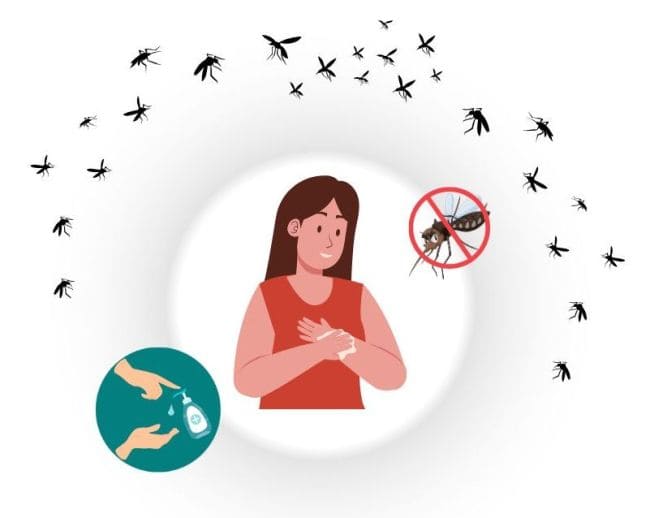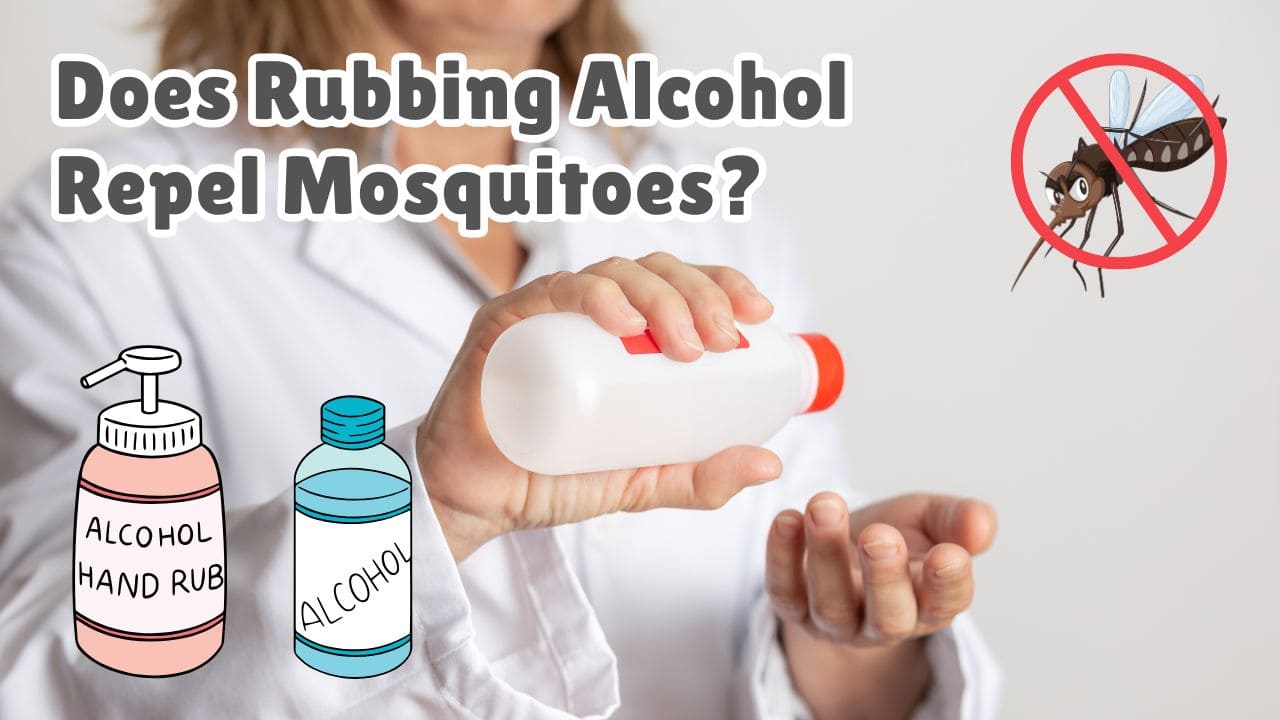Table of Contents
To study and understand how actually does rubbing alcohol repel mosquitoes, let us see what actually is rubbing alcohol and whether it can be used to kill or repel mosquitoes and their larvae.
What is rubbing alcohol?
Rubbing alcohol is a clear colorless liquid normally found in very household being used mainly as cleaning agent and disinfectant. It has a strong and pungent odor. Chemically, rubbing alcohol is isopropyl alcohol or isopropanol. It is available commercially in concentrations ranging from 70 to 99%. For medical and household applications, 70% isopropyl alcohol is mainly used.
It is also used as an antiseptic to clean wounds and sanitize surfaces, as it efficiently kills bacteria and viruses. One of the most popular cleaner and disinfectant used widely in every household, “Pine Sol” contains isopropyl alcohol. As we have already discussed the possibility and effectiveness of using Pine sol as mosquito repellent before, we will directly jump on to our present topic below.
Does rubbing alcohol repel mosquitoes?
There is not much scientific evidence which can confirm the usability and effectiveness of alcohol in repelling mosquitoes. Theoretical explanation may go like this, the strong odor of rubbing alcohol interferes with the body odor and carbon dioxide that is released by humans. Due to this mosquitoes were unable to locate their target hosts.
However, the quick evaporation of rubbing alcohol gives a temporary protection which is very short lived. The potential mosquito repelling effect disappears once the alcohol evaporates and thus makes it a very poor choice as a mosquito repellent.
The use of hand sanitizer also has similar mosquito repelling effect which does not give any sustainable long lasting protection, but it is not a reliable option.

Can drinking alcohol repel mosquitoes?
No, drinking alcohol repel mosquitoes is just another myth and it is completely false and misleading. On the other hand, it makes you more susceptible to mosquito attacks and mosquito bites because consuming alcohol makes you more attractive to mosquitoes by releasing more body heat and carbon dioxide.
Drinking alcohol increases your blood flow to the skin and hence makes it easier for mosquitoes to locate and increases chances of being bitten. There is no any alteration in our body chemistry that may repel mosquitoes, but alcohol consumption actually amplifies the factors that may attract mosquitoes.
Does alcohol kill mosquitoes?
Yes, alcohol can kill mosquitoes only when it comes in direct contact with the rubbing alcohol. Mosquitoes in general cannot withstand dry climate and dehydrate soon. Any contact with rubbing alcohol (having a high alcohol content) dry out mosquito’s exoskeleton which leads to their death.
Just similar to how bacteria, germs and viruses are killed by alcohol. It dissolves the cell membranes specially the lipid protein outer layer of the micro organisms.
if you are concerned about mosquitoes bothering you inside your home or room, spraying dilute solution of rubbing alcohol directly on mosquitoes will kill the mosquitoes instantly but it is not possible to search, find and spray alcohol on each mosquito. Thus, killing individual mosquitoes is not a solution and will not give any significant reduction in mosquito population.
Can alcohol kill mosquito larvae and their eggs?
Yes, certain long chain aliphatic alcohols have been found to be effective in killing mosquito larvae and prevents hatching of eggs.
70% Alcohol is better than 90% alcohol in killing of bacteria and other micro organisms. 70% isopropyl alcohol dissolves the cell membrane and coagulates the lipid proteins inside the cell. The bacterial cell wall consists of proteins and carbohydrate chains and a lipopolysaccharide outer layer.
The absolute 99% alcohol or 90% alcohol, coagulates the outer layers of the cell instantly which inhibits further penetration and coagulation of inner proteins. This most of the time fails to kill the microbes, bacteria, etc. But when 70% alcohol is used, the water in it acts as a catalyst and easily penetrates the already coagulated lipid layer, and coagulates all the protein in the cell.
The 70% alcohol contains more water and therefore it takes some time to evaporate as compared to absolute or 90% alcohol. This increased time of contact is also responsible for completely damaging the bacterial cell.
Effectiveness of rubbing alcohol against mosquitoes
Rubbing alcohol repel mosquitoes but is not reliable as it fails to give long term mosquito prevention, the temporary effect is just for a short while and cannot compete with other known chemical based or natural mosquito repellents.
The use of rubbing alcohol is not at all advisable because it is so quick drying that within no time it disappears. And once it evaporates, mosquitoes will soon be able to find and locate for biting. Because of this short term effect, it finds no use in any outdoor applications as mosquito repellent.
People looking for long lasting methods should use commercial products like DEET, picaridin, essential oils, etc. that are designed for that particular purpose.
Risk and side effects of using alcohol as mosquito repellent
- Rubbing alcohol may cause skin irritation when applied in larger quantities and sensitive areas.
- It is inflammable and may cause accidental fire hazard. After applying alcohol if you enter area near fire like barbecue, campfire, fire pits, etc. may result in burns and fire accidents.
- Prolonged and excess use may dry out the skin resulting in peeling and itching.
- Individuals with sensitive skin should take special precautions while using rubbing alcohol on their skin.
Conclusion: Does rubbing alcohol repel mosquitoes?
Although having a repelling effect against mosquitoes, it cannot be used as mosquito repellent due to its quick evaporating nature. Drinking alcohol, further exaggerate the mosquito attraction by increasing the body heat and body odor, carbon dioxide smell, etc.
However, rubbing alcohol can be effectively used in disrupting the breeding and development process of larvae in stagnant water.
For long lasting mosquito repelling effect, one should opt for other methods like Insecticide (DEET, Picaridin), Essential oils (citronella, eucalyptus, tea tree oil, peppermint oil, etc.), Mosquito traps, zappers, coils, vaporizers and diffusers, etc.
Frequently Asked Questions (FAQs)
-
How do mosquitoes react to alcohol?
Mosquitoes find the smell of rubbing alcohol very unpleasant and they stay prefer to stay away. But when a person consumes alcohol, there are certain changes that occurs in his body like increased body heat and odor, which attracts mosquitoes.
-
Can I spray alcohol on mosquito bites?
Yes, after mosquito bites you can spray alcohol as it has got disinfectant properties and thus prevents infection. Rubbing alcohol has a cooling effect and thus reduces the skin temperature. This soothes the bite area and gives relief from itching. However, any excess use of alcohol will cause skin irritations.
-
Do mosquitoes hate the smell of alcohol?
The strong pungent odor of rubbing alcohol is not pleasing for mosquitoes. It helps in keeping mosquitoes away. But the effect is very short lived and as soon as alcohol evaporates, you will need to reapply again. This is not possible for a long term prevention and frequent application will also dry out your skin excessively.
-
Will alcohol kill mosquito larvae?
Yes alcohol kill mosquito larvae in water and prevents egg hatching. The alcohol attacks the cell wall of microbes and organisms, degrades the outer protein layer and penetrates inside to dissolve the proteins.
-
What alcohol attracts mosquitoes?
Rubbing alcohol when applied or sprayed on skin and surroundings, repels mosquitoes. But when alcohol is consumed it increases the body heat and body odor by increasing the body temperature and amount of carbon dioxide released. Thus alcohol consumption will attract mosquitoes.

